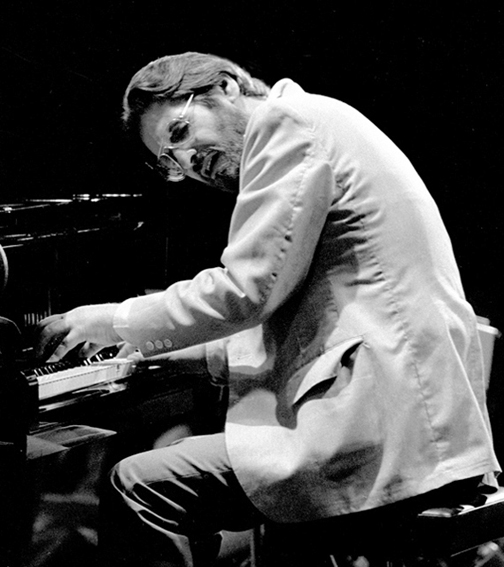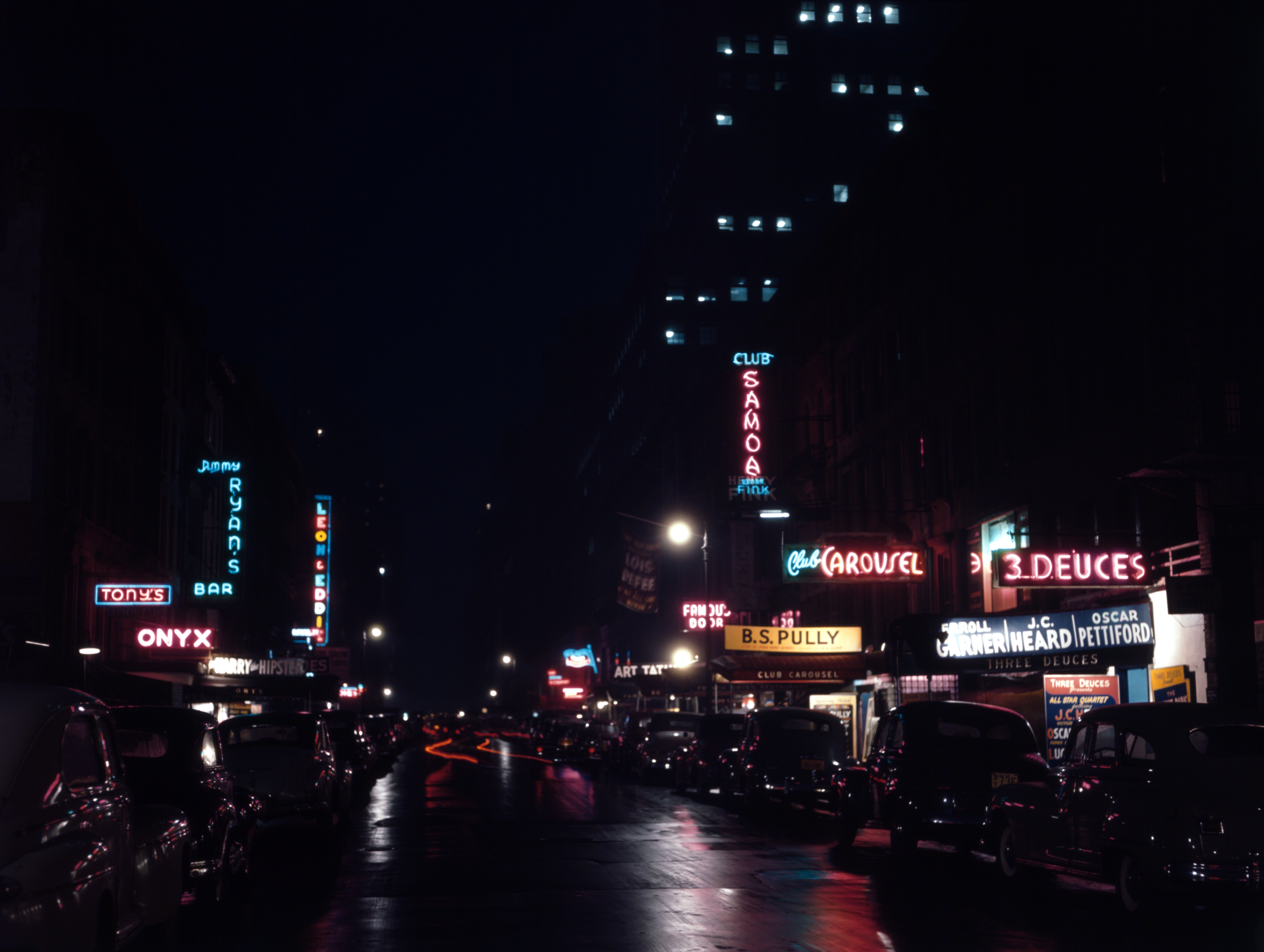|
Frank Paparelli
Frank Paparelli (* December 25, 1917 in Providence, Rhode Island; †May 24, 1973 in Los Angeles, California) was an American Jazz pianist, Composer and Author. He was a pianist in Dizzy Gillespie's band during the mid-1940s, and is notable as the co-writer (with Gillespie) of the bebop standard " A Night in Tunisia" and "Blue 'n' Boogie". Publications *''The Blues and how to Play 'em''. Piano method book. New York, Leeds Music 1942 *Don Raye/Frank Paparelli: ''Piano Music – (That Place) Down the Road a Piece''. D. Davis & Co. 1943. *''Nat 'King' Cole – Piano Capers'', Transcribed and Edited by Frank Paparelli. New York: Leeds Music Ltd. 1946 *''2 to the Bar - Dixieland Piano Method''. New York City, Leeds Music Corporation 1946 *''Thelonious Monk, Dizzy Gillespie – 52nd Street Theme - Be-Bop (New Jazz)'', arranged by Frank Paparelli. London, Bosworth & Co 1948 *''Dizzy Gillespie, Gil Fuller, Jay Roberts – Oop Bop SH-Bam - Be-Bop (New Jazz)'', arranged by Frank Paparelli. ... [...More Info...] [...Related Items...] OR: [Wikipedia] [Google] [Baidu] |
Jazz Pianist
Jazz piano is a collective term for the techniques pianists use when playing jazz. The piano has been an integral part of the jazz idiom since its inception, in both solo and ensemble settings. Its role is multifaceted due largely to the instrument's combined melodic and harmonic capabilities. For this reason it is an important tool of jazz musicians and composers for teaching and learning jazz theory and set arrangement, regardless of their main instrument. By extension the phrase 'jazz piano' can refer to similar techniques on any keyboard instrument. Along with the guitar, vibraphone, and other keyboard instruments, the piano is one of the instruments in a jazz combo that can play both single notes and chords rather than only single notes as does the saxophone or trumpet. Beginning A new style known as “stride” or “Harlem stride” emerged during the 1920s, predominantly in New York. James P. Johnson was a prominent adherent. The left hand was used to establish rhyth ... [...More Info...] [...Related Items...] OR: [Wikipedia] [Google] [Baidu] |
Dizzy Gillespie
John Birks "Dizzy" Gillespie (; October 21, 1917 – January 6, 1993) was an American jazz trumpeter, bandleader, composer, educator and singer. He was a trumpet virtuoso and improviser, building on the virtuosic style of Roy Eldridge but adding layers of harmonic and rhythmic complexity previously unheard in jazz. His combination of musicianship, showmanship, and wit made him a leading popularizer of the new music called bebop. His beret and horn-rimmed spectacles, scat singing, bent horn, pouched cheeks, and light-hearted personality provided one of bebop's most prominent symbols. In the 1940s, Gillespie, with Charlie Parker, became a major figure in the development of bebop and modern jazz. He taught and influenced many other musicians, including trumpeters Miles Davis, Jon Faddis, Fats Navarro, Clifford Brown, Arturo Sandoval, Lee Morgan, Chuck Mangione, and balladeer Johnny Hartman. He pioneered Afro-Cuban jazz and won several Grammy Awards. Scott Yanow wrot ... [...More Info...] [...Related Items...] OR: [Wikipedia] [Google] [Baidu] |
Bebop
Bebop or bop is a style of jazz developed in the early-to-mid-1940s in the United States. The style features compositions characterized by a fast tempo, complex chord progressions with rapid chord changes and numerous changes of key, instrumental virtuosity, and improvisation based on a combination of harmonic structure, the use of scales and occasional references to the melody. Bebop developed as the younger generation of jazz musicians expanded the creative possibilities of jazz beyond the popular, dance-oriented swing music-style with a new "musician's music" that was not as danceable and demanded close listening.Lott, Eric. Double V, Double-Time: Bebop's Politics of Style. Callaloo, No. 36 (Summer, 1988), pp. 597–605 As bebop was not intended for dancing, it enabled the musicians to play at faster tempos. Bebop musicians explored advanced harmonies, complex syncopation, altered chords, extended chords, chord substitutions, asymmetrical phrasing, and intricate melodies ... [...More Info...] [...Related Items...] OR: [Wikipedia] [Google] [Baidu] |
Jazz Standard
Jazz standards are musical compositions that are an important part of the musical repertoire of jazz musicians, in that they are widely known, performed, and recorded by jazz musicians, and widely known by listeners. There is no definitive list of jazz standards, and the list of songs deemed to be standards changes over time. Songs included in major fake book publications (sheet music collections of popular tunes) and jazz reference works offer a rough guide to which songs are considered standards. Not all jazz standards were written by jazz composers. Many are originally Tin Pan Alley popular songs, Broadway show tunes or songs from Hollywood musicals – the Great American Songbook. In Europe, jazz standards and " fake books" may even include some traditional folk songs (such as in Scandinavia) or pieces of ethnic music (such as gypsy melodies) that have been played with a jazz feel by well known jazz players. A commonly played song can only be considered a jazz stan ... [...More Info...] [...Related Items...] OR: [Wikipedia] [Google] [Baidu] |
A Night In Tunisia
"A Night in Tunisia" is a musical composition written by Dizzy Gillespie around 1940–42, while Gillespie was playing with the Benny Carter band. It has become a jazz standard. It is also known as "Interlude", and with lyrics by Raymond Leveen was recorded by Sarah Vaughan in 1944. Composition Gillespie called the tune "Interlude" and said "some genius decided to call it 'Night in Tunisia'". He said the tune was composed at the piano at Kelly's Stables in New York. He gave Frank Paparelli co-writer credit in compensation for some unrelated transcription work, but Paparelli had nothing to do with the song. "A Night in Tunisia" was one of the signature pieces of Gillespie's bebop big band, and he also played it with his small groups. In January 2004, The Recording Academy added the 1946 Victor recording by Gillespie to the Grammy Hall of Fame. On the album ''A Night at Birdland Vol. 1'', Art Blakey introduced his 1954 cover version with this statement: "At this time we'd like to ... [...More Info...] [...Related Items...] OR: [Wikipedia] [Google] [Baidu] |
Blue 'n' Boogie
Blue 'n' Boogie is a 1944 jazz standard. It was written by Dizzy Gillespie and Frank Paparelli. It can be found on Gillespie's 1955 compilation album ''Groovin' High'', and was notably performed by trumpeter Miles Davis on ''Miles Davis All-Star Sextet'' (1954; later released as the first side of ''Walkin'''), guitarist Wes Montgomery on ''Full House'' (1962), and Sonny Rollins on '' Now's the Time'' (1964). See also *List of jazz standards A ''list'' is any set of items in a row. List or lists may also refer to: People * List (surname) Organizations * List College, an undergraduate division of the Jewish Theological Seminary of America * SC Germania List, German rugby union ... References 1940s jazz standards 1944 songs Bebop jazz standards Compositions by Dizzy Gillespie {{1940s-jazz-composition-stub ... [...More Info...] [...Related Items...] OR: [Wikipedia] [Google] [Baidu] |
Discogs
Discogs (short for discographies) is a database of information about audio recordings, including commercial releases, promotional releases, and bootleg or off-label releases. While the site was originally created with a goal of becoming the largest online database of electronic music, the site now includes releases in all genres on all formats. After the database was opened to contributions from the public, rock music began to become the most prevalent genre listed. , Discogs contains over 15.7 million releases, by over 8.3 million artists, across over 1.9 million labels, contributed from over 644,000 contributor user accounts – with these figures constantly growing as users continually add previously unlisted releases to the site over time. The Discogs servers, currently hosted under the domain name discogs.com, are owned by Zink Media, Inc. and located in Portland, Oregon, United States. History The discogs.com domain name was registered in August 2000, and Discogs its ... [...More Info...] [...Related Items...] OR: [Wikipedia] [Google] [Baidu] |
1917 Births
Events Below, the events of World War I have the "WWI" prefix. January * January 9 – WWI – Battle of Rafa: The last substantial Ottoman Army garrison on the Sinai Peninsula is captured by the Egyptian Expeditionary Force's Desert Column. * January 10 – Imperial Trans-Antarctic Expedition: Seven survivors of the Ross Sea party were rescued after being stranded for several months. * January 11 – Unknown saboteurs set off the Kingsland Explosion at Kingsland (modern-day Lyndhurst, New Jersey), one of the events leading to United States involvement in WWI. * January 16 – The Danish West Indies is sold to the United States for $25 million. * January 22 – WWI: United States President Woodrow Wilson calls for "peace without victory" in Germany. * January 25 ** WWI: British armed merchantman is sunk by mines off Lough Swilly (Ireland), with the loss of 354 of the 475 aboard. ** An anti-prostitution drive in San Francisco occurs, and police ... [...More Info...] [...Related Items...] OR: [Wikipedia] [Google] [Baidu] |
1973 Deaths
Events January * January 1 - The United Kingdom, the Republic of Ireland and Denmark enter the European Economic Community, which later becomes the European Union. * January 15 – Vietnam War: Citing progress in peace negotiations, U.S. President Richard Nixon announces the suspension of offensive action in North Vietnam. * January 17 – Ferdinand Marcos becomes President for Life of the Philippines. * January 20 – Richard Nixon is sworn in for a second term as President of the United States. Nixon is the only person to have been sworn in twice as President (1969, 1973) and Vice President of the United States (1953, 1957). * January 22 ** George Foreman defeats Joe Frazier to win the heavyweight world boxing championship. ** A Royal Jordanian Boeing 707 flight from Jeddah crashes in Kano, Nigeria; 176 people are killed. * January 27 – U.S. involvement in the Vietnam War ends with the signing of the Paris Peace Accords. February * February 8 â ... [...More Info...] [...Related Items...] OR: [Wikipedia] [Google] [Baidu] |





